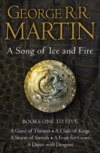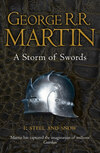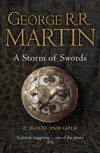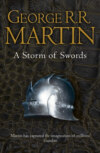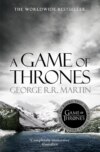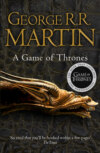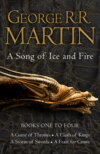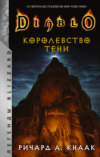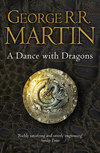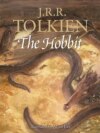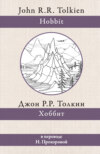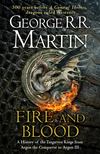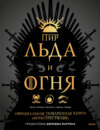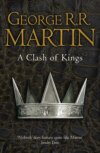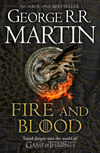Читать книгу: «A Game of Thrones: The Story Continues Books 1-5», страница 21
EDDARD
“Lord Arryn’s death was a great sadness for all of us, my lord,” Grand Maester Pycelle said. “I would be more than happy to tell you what I can of the manner of his passing. Do be seated. Would you care for refreshments? Some dates, perhaps? I have some very fine persimmons as well. Wine no longer agrees with my digestion, I fear, but I can offer you a cup of iced milk, sweetened with honey. I find it most refreshing in this heat.”
There was no denying the heat; Ned could feel the silk tunic clinging to his chest. Thick, moist air covered the city like a damp woolen blanket, and the riverside had grown unruly as the poor fled their hot, airless warrens to jostle for sleeping places near the water, where the only breath of wind was to be found. “That would be most kind,” Ned said, seating himself.
Pycelle lifted a tiny silver bell with thumb and forefinger and tinkled it gently. A slender young serving girl hurried into the solar. “Iced milk for the King’s Hand and myself, if you would be so kind, child. Well sweetened.”
As the girl went to fetch their drinks, the Grand Maester knotted his fingers together and rested his hands on his stomach. “The smallfolk say that the last year of summer is always the hottest. It is not so, yet ofttimes it feels that way, does it not? On days like this, I envy you northerners your summer snows.” The heavy jeweled chain around the old man’s neck chinked softly as he shifted in his seat. “To be sure, King Maekar’s summer was hotter than this one, and near as long. There were fools, even in the Citadel, who took that to mean that the Great Summer had come at last, the summer that never ends, but in the seventh year it broke suddenly, and we had a short autumn and a terrible long winter. Still, the heat was fierce while it lasted. Oldtown steamed and sweltered by day and came alive only by night. We would walk in the gardens by the river and argue about the gods. I remember the smells of those nights, my lord—perfume and sweat, melons ripe to bursting, peaches and pomegranates, nightshade and moonbloom. I was a young man then, still forging my chain. The heat did not exhaust me as it does now.” Pycelle’s eyes were so heavily lidded he looked half asleep. “My pardons, Lord Eddard. You did not come to hear foolish meanderings of a summer forgotten before your father was born. Forgive an old man his wanderings, if you would. Minds are like swords, I do fear. The old ones go to rust. Ah, and here is our milk.” The serving girl placed the tray between them, and Pycelle gave her a smile. “Sweet child.” He lifted a cup, tasted, nodded. “Thank you. You may go.”
When the girl had taken her leave, Pycelle peered at Ned through pale, rheumy eyes. “Now where were we? Oh, yes. You asked about Lord Arryn …”
“I did.” Ned sipped politely at the iced milk. It was pleasantly cold, but oversweet to his taste.
“If truth be told, the Hand had not seemed quite himself for some time,” Pycelle said. “We had sat together on council many a year, he and I, and the signs were there to read, but I put them down to the great burdens he had borne so faithfully for so long. Those broad shoulders were weighed down by all the cares of the realm, and more besides. His son was ever sickly, and his lady wife so anxious that she would scarcely let the boy out of her sight. It was enough to weary even a strong man, and the Lord Jon was not young. Small wonder if he seemed melancholy and tired. Or so I thought at the time. Yet now I am less certain.” He gave a ponderous shake of his head.
“What can you tell me of his final illness?”
The Grand Maester spread his hands in a gesture of helpless sorrow. “He came to me one day asking after a certain book, as hale and healthy as ever, though it did seem to me that something was troubling him deeply. The next morning, he was twisted over in pain, too sick to rise from bed. Maester Colemon thought it was a chill on the stomach. The weather had been hot, and the Hand often iced his wine, which can upset the digestion. When Lord Jon continued to weaken, I went to him myself, but the gods did not grant me the power to save him.”
“I have heard that you sent Maester Colemon away.”
The Grand Maester’s nod was as slow and deliberate as a glacier. “I did, and I fear the Lady Lysa will never forgive me that. Maybe I was wrong, but at the time I thought it best. Maester Colemon is like a son to me, and I yield to none in my esteem for his abilities, but he is young, and the young ofttimes do not comprehend the frailty of an older body. He was purging Lord Arryn with wasting potions and pepper juice, and I feared he might kill him.”
“Did Lord Arryn say anything to you during his final hours?”
Pycelle wrinkled his brow. “In the last stage of his fever, the Hand called out the name Robert several times, but whether he was asking for his son or for the king I could not say. Lady Lysa would not permit the boy to enter the sickroom, for fear that he too might be taken ill. The king did come, and he sat beside the bed for hours, talking and joking of times long past in hopes of raising Lord Jon’s spirits. His love was fierce to see.”
“Was there nothing else? No final words?”
“When I saw that all hope had fled, I gave the Hand the milk of the poppy, so he should not suffer. Just before he closed his eyes for the last time, he whispered something to the king and his lady wife, a blessing for his son. The seed is strong, he said. At the end, his speech was too slurred to comprehend. Death did not come until the next morning, but Lord Jon was at peace after that. He never spoke again.”
Ned took another swallow of milk, trying not to gag on the sweetness of it. “Did it seem to you that there was anything unnatural about Lord Arryn’s death?”
“Unnatural?” The aged maester’s voice was thin as a whisper. “No, I could not say so. Sad, for a certainty. Yet in its own way, death is the most natural thing of all, Lord Eddard. Jon Arryn rests easy now, his burdens lifted at last.”
“This illness that took him,” said Ned. “Had you ever seen its like before, in other men?”
“Near forty years I have been Grand Maester of the Seven Kingdoms,” Pycelle replied. “Under our good King Robert, and Aerys Targaryen before him, and his father Jaehaerys the Second before him, and even for a few short months under Jaehaerys’s father, Aegon the Fortunate, the Fifth of His Name. I have seen more of illness than I care to remember, my lord. I will tell you this: Every case is different, and every case is alike. Lord Jon’s death was no stranger than any other.”
“His wife thought otherwise.”
The Grand Maester nodded. “I recall now, the widow is sister to your own noble wife. If an old man may be forgiven his blunt speech, let me say that grief can derange even the strongest and most disciplined of minds, and the Lady Lysa was never that. Since her last stillbirth, she has seen enemies in every shadow, and the death of her lord husband left her shattered and lost.”
“So you are quite certain that Jon Arryn died of a sudden illness?”
“I am,” Pycelle replied gravely. “If not illness, my good lord, what else could it be?”
“Poison,” Ned suggested quietly.
Pycelle’s sleepy eyes flicked open. The aged maester shifted uncomfortably in his seat. “A disturbing thought. We are not the Free Cities, where such things are common. Grand Maester Aethelmure wrote that all men carry murder in their hearts, yet even so, the poisoner is beneath contempt.” He fell silent for a moment, his eyes lost in thought. “What you suggest is possible, my lord, yet I do not think it likely. Every hedge maester knows the common poisons, and Lord Arryn displayed none of the signs. And the Hand was loved by all. What sort of monster in man’s flesh would dare to murder such a noble lord?”
“I have heard it said that poison is a woman’s weapon.”
Pycelle stroked his beard thoughtfully. “It is said. Women, cravens … and eunuchs.” He cleared his throat and spat a thick glob of phlegm onto the rushes. Above them, a raven cawed loudly in the rookery. “The Lord Varys was born a slave in Lys, did you know? Put not your trust in spiders, my lord.”
That was scarcely anything Ned needed to be told; there was something about Varys that made his flesh crawl. “I will remember that, Maester. And I thank you for your help. I have taken enough of your time.” He stood.
Grand Maester Pycelle pushed himself up from his chair slowly and escorted Ned to the door. “I hope I have helped in some small way to put your mind at ease. If there is any other service I might perform, you need only ask.”
“One thing,” Ned told him. “I should be curious to examine the book that you lent Jon the day before he fell ill.”
“I fear you would find it of little interest,” Pycelle said. “It was a ponderous tome by Grand Maester Malleon on the lineages of the great houses.”
“Still, I should like to see it.”
The old man opened the door. “As you wish. I have it here somewhere. When I find it, I shall have it sent to your chambers straightaway.”
“You have been most courteous,” Ned told him. Then, almost as an afterthought, he said, “One last question, if you would be so kind. You mentioned that the king was at Lord Arryn’s bedside when he died. I wonder, was the queen with him?”
“Why, no,” Pycelle said. “She and the children were making the journey to Casterly Rock, in company with her father. Lord Tywin had brought a retinue to the city for the tourney on Prince Joffrey’s name day, no doubt hoping to see his son Jaime win the champion’s crown. In that he was sadly disappointed. It fell to me to send the queen word of Lord Arryn’s sudden death. Never have I sent off a bird with a heavier heart.”
“Dark wings, dark words,” Ned murmured. It was a proverb Old Nan had taught him as a boy.
“So the fishwives say,” Grand Maester Pycelle agreed, “but we know it is not always so. When Maester Luwin’s bird brought the word about your Bran, the message lifted every true heart in the castle, did it not?”
“As you say, Maester.”
“The gods are merciful.” Pycelle bowed his head. “Come to me as often as you like, Lord Eddard. I am here to serve.”
Yes, Ned thought as the door swung shut, but whom?
On the way back to his chambers, he came upon his daughter Arya on the winding steps of the Tower of the Hand, windmilling her arms as she struggled to balance on one leg. The rough stone had scuffed her bare feet. Ned stopped and looked at her. “Arya, what are you doing?”
“Syrio says a water dancer can stand on one toe for hours.” Her hands flailed at the air to steady herself.
Ned had to smile. “Which toe?” he teased.
“Any toe,” Arya said, exasperated with the question. She hopped from her right leg to her left, swaying dangerously before she regained her balance.
“Must you do your standing here?” he asked. “It’s a long hard fall down these steps.”
“Syrio says a water dancer never falls.” She lowered her leg to stand on two feet. “Father, will Bran come and live with us now?”
“Not for a long time, sweet one,” he told her. “He needs to win his strength back.”
Arya bit her lip. “What will Bran do when he’s of age?”
Ned knelt beside her. “He has years to find that answer, Arya. For now, it is enough to know that he will live.” The night the bird had come from Winterfell, Eddard Stark had taken the girls to the castle godswood, an acre of elm and alder and black cottonwood overlooking the river. The heart tree there was a great oak, its ancient limbs overgrown with smokeberry vines; they knelt before it to offer their thanksgiving, as if it had been a weirwood. Sansa drifted to sleep as the moon rose, Arya several hours later, curling up in the grass under Ned’s cloak. All through the dark hours he kept his vigil alone. When dawn broke over the city, the dark red blooms of dragon’s breath surrounded the girls where they lay. “I dreamed of Bran,” Sansa had whispered to him. “I saw him smiling.”
“He was going to be a knight,” Arya was saying now. “A knight of the Kingsguard. Can he still be a knight?”
“No,” Ned said. He saw no use in lying to her. “Yet someday he may be the lord of a great holdfast and sit on the king’s council. He might raise castles like Brandon the Builder, or sail a ship across the Sunset Sea, or enter your mother’s Faith and become the High Septon.” But he will never run beside his wolf again, he thought with a sadness too deep for words, or lie with a woman, or hold his own son in his arms.
Arya cocked her head to one side. “Can I be a king’s councillor and build castles and become the High Septon?”
“You,” Ned said, kissing her lightly on the brow, “will marry a king and rule his castle, and your sons will be knights and princes and lords and, yes, perhaps even a High Septon.”
Arya screwed up her face. “No,” she said, “that’s Sansa.” She folded up her right leg and resumed her balancing. Ned sighed and left her there.
Inside his chambers, he stripped off his sweat-stained silks and sluiced cold water over his head from the basin beside the bed. Alyn entered as he was drying his face. “My lord,” he said, “Lord Baelish is without and begs audience.”
“Escort him to my solar,” Ned said, reaching for a fresh tunic, the lightest linen he could find. “I’ll see him at once.”
Littlefinger was perched on the window seat when Ned entered, watching the knights of the Kingsguard practice at swords in the yard below. “If only old Selmy’s mind were as nimble as his blade,” he said wistfully, “our council meetings would be a good deal livelier.”
“Ser Barristan is as valiant and honorable as any man in King’s Landing.” Ned had come to have a deep respect for the aged, white-haired Lord Commander of the Kingsguard.
“And as tiresome,” Littlefinger added, “though I daresay he should do well in the tourney. Last year he unhorsed the Hound, and it was only four years ago that he was champion.”
The question of who might win the tourney interested Eddard Stark not in the least. “Is there a reason for this visit, Lord Petyr, or are you here simply to enjoy the view from my window?”
Littlefinger smiled. “I promised Cat I would help you in your inquiries, and so I have.”
That took Ned aback. Promise or no promise, he could not find it in him to trust Lord Petyr Baelish, who struck him as too clever by half. “You have something for me?”
“Someone,” Littlefinger corrected. “Four someones, if truth be told. Had you thought to question the Hand’s servants?”
Ned frowned. “Would that I could. Lady Arryn took her household back to the Eyrie.” Lysa had done him no favor in that regard. All those who had stood closest to her husband had gone with her when she fled: Jon’s maester, his steward, the captain of his guard, his knights and retainers.
“Most of her household,” Littlefinger said, “not all. A few remain. A pregnant kitchen girl hastily wed to one of Lord Renly’s grooms, a stablehand who joined the City Watch, a potboy discharged from service for theft, and Lord Arryn’s squire.”
“His squire?” Ned was pleasantly surprised. A man’s squire often knew a great deal of his comings and goings.
“Ser Hugh of the Vale,” Littlefinger named him. “The king knighted the boy after Lord Arryn’s death.”
“I shall send for him,” Ned said. “And the others.”
Littlefinger winced. “My lord, step over here to the window, if you would be so kind.”
“Why?”
“Come, and I’ll show you, my lord.”
Frowning, Ned crossed to the window. Petyr Baelish made a casual gesture. “There, across the yard, at the door of the armory, do you see the boy squatting by the steps honing a sword with an oilstone?”
“What of him?”
“He reports to Varys. The Spider has taken a great interest in you and all your doings.” He shifted in the window seat. “Now glance at the wall. Farther west, above the stables. The guardsman leaning on the ramparts?”
Ned saw the man. “Another of the eunuch’s whisperers?”
“No, this one belongs to the queen. Notice that he enjoys a fine view of the door to this tower, the better to note who calls on you. There are others, many unknown even to me. The Red Keep is full of eyes. Why do you think I hid Cat in a brothel?”
Eddard Stark had no taste for these intrigues. “Seven hells,” he swore. It did seem as though the man on the walls was watching him. Suddenly uncomfortable, Ned moved away from the window. “Is everyone someone’s informer in this cursed city?”
“Scarcely,” said Littlefinger. He counted on the fingers on his hand. “Why, there’s me, you, the king … although, come to think on it, the king tells the queen much too much, and I’m less than certain about you.” He stood up. “Is there a man in your service that you trust utterly and completely?”
“Yes,” said Ned.
“In that case, I have a delightful palace in Valyria that I would dearly love to sell you,” Littlefinger said with a mocking smile. “The wiser answer was no, my lord, but be that as it may. Send this paragon of yours to Ser Hugh and the others. Your own comings and goings will be noted, but even Varys the Spider cannot watch every man in your service every hour of the day.” He started for the door.
“Lord Petyr,” Ned called after him. “I … am grateful for your help. Perhaps I was wrong to distrust you.”
Littlefinger fingered his small pointed beard. “You are slow to learn, Lord Eddard. Distrusting me was the wisest thing you’ve done since you climbed down off your horse.”
JON
Jon was showing Dareon how best to deliver a sidestroke when the new recruit entered the practice yard. “Your feet should be farther apart,” he urged. “You don’t want to lose your balance.
That’s good. Now pivot as you deliver the stroke, get all your weight behind the blade.”
Dareon broke off and lifted his visor. “Seven gods,” he murmured. “Would you look at this, Jon.”
Jon turned. Through the eye slit of his helm, he beheld the fattest boy he had ever seen standing in the door of the armory. By the look of him, he must have weighed twenty stone. The fur collar of his embroidered surcoat was lost beneath his chins. Pale eyes moved nervously in a great round moon of a face, and plump sweaty fingers wiped themselves on the velvet of his doublet. “They … they told me I was to come here for … for training,” he said to no one in particular.
“A lordling,” Pyp observed to Jon. “Southron, most like near Highgarden.” Pyp had traveled the Seven Kingdoms with a mummers’ troupe, and bragged that he could tell what you were and where you’d been born just from the sound of your voice.
A striding huntsman had been worked in scarlet thread upon the breast of the fat boy’s fur-trimmed surcoat. Jon did not recognize the sigil. Ser Alliser Thorne looked over his new charge and said, “It would seem they have run short of poachers and thieves down south. Now they send up pigs to man the Wall. Is fur and velvet your notion of armor, my Lord of Ham?”
It was soon revealed that the new recruit had brought his own armor with him; padded doublet, boiled leather, mail and plate and helm, even a great wood-and-leather shield blazoned with the same striding huntsman he wore on his surcoat. As none of it was black, however, Ser Alliser insisted that he reequip himself from the armory. That took half the morning. His girth required Donal Noye to take apart a mail hauberk and refit it with leather panels at the sides. To get a helm over his head the armorer had to detach the visor. His leathers bound so tightly around his legs and under his arms that he could scarcely move. Dressed for battle, the new boy looked like an overcooked sausage about to burst its skin. “Let us hope you are not as inept as you look,” Ser Alliser said. “Halder, see what Ser Piggy can do.”
Jon Snow winced. Halder had been born in a quarry and apprenticed as a stonemason. He was sixteen, tall and muscular, and his blows were as hard as any Jon had ever felt. “This will be uglier than a whore’s ass,” Pyp muttered, and it was.
The fight lasted less than a minute before the fat boy was on the ground, his whole body shaking as blood leaked through his shattered helm and between his pudgy fingers. “I yield,” he shrilled. “No more, I yield, don’t hit me.” Rast and some of the other boys were laughing.
Even then, Ser Alliser would not call an end. “On your feet, Ser Piggy,” he called. “Pick up your sword.” When the boy continued to cling to the ground, Thorne gestured to Halder. “Hit him with the flat of your blade until he finds his feet.” Halder delivered a tentative smack to his foe’s upraised cheeks. “You can hit harder than that,” Thorne taunted. Halder took hold of his longsword with both hands and brought it down so hard the blow split leather, even on the flat. The new boy screeched in pain.
Jon Snow took a step forward. Pyp laid a mailed hand on his arm. “Jon, no,” the small boy whispered with an anxious glance at Ser Alliser Thorne.
“On your feet,” Thorne repeated. The fat boy struggled to rise, slipped, and fell heavily again. “Ser Piggy is starting to grasp the notion,” Ser Alliser observed. “Again.”
Halder lifted the sword for another blow. “Cut us off a ham!” Rast urged, laughing.
Jon shook off Pyp’s hand. “Halder, enough.”
Halder looked to Ser Alliser.
“The Bastard speaks and the peasants tremble,” the master-at-arms said in that sharp, cold voice of his. “I remind you that I am the master-at-arms here, Lord Snow.”
“Look at him, Halder,” Jon urged, ignoring Thorne as best he could. “There’s no honor in beating a fallen foe. He yielded.” He knelt beside the fat boy.
Halder lowered his sword. “He yielded,” he echoed.
Ser Alliser’s onyx eyes were fixed on Jon Snow. “It would seem our Bastard is in love,” he said as Jon helped the fat boy to his feet. “Show me your steel, Lord Snow.”
Jon drew his longsword. He dared defy Ser Alliser only to a point, and he feared he was well beyond it now.
Thorne smiled. “The Bastard wishes to defend his lady love, so we shall make an exercise of it. Rat, Pimple, help our Stone Head here.” Rast and Albett moved to join Halder. “Three of you ought to be sufficient to make Lady Piggy squeal. All you need do is get past the Bastard.”
“Stay behind me,” Jon said to the fat boy. Ser Alliser had often sent two foes against him, but never three. He knew he would likely go to sleep bruised and bloody tonight. He braced himself for the assault.
Suddenly Pyp was beside him. “Three to two will make for better sport,” the small boy said cheerfully. He dropped his visor and slid out his sword. Before Jon could even think to protest, Grenn had stepped up to make a third.
The yard had grown deathly quiet. Jon could feel Ser Alliser’s eyes. “Why are you waiting?” he asked Rast and the others in a voice gone deceptively soft, but it was Jon who moved first. Halder barely got his sword up in time.
Jon drove him backward, attacking with every blow, keeping the older boy on the heels. Know your foe, Ser Rodrik had taught him once; Jon knew Halder, brutally strong but short of patience, with no taste for defense. Frustrate him, and he would leave himself open, as certain as sunset.
The clang of steel echoed through the yard as the others joined battle around him. Jon blocked a savage cut at his head, the shock of impact running up his arm as the swords crashed together. He slammed a sidestroke into Halder’s ribs, and was rewarded with a muffled grunt of pain. The counterstroke caught Jon on the shoulder. Chainmail crunched, and pain flared up his neck, but for an instant. Halder was unbalanced. Jon cut his left leg from under him, and he fell with a curse and a crash.
Grenn was standing his ground as Jon had taught him, giving Albett more than he cared for, but Pyp was hard-pressed. Rast had two years and forty pounds on him. Jon stepped up behind him and rang the raper’s helm like a bell. As Rast went reeling, Pyp slid in under his guard, knocked him down, and leveled a blade at his throat. By then, Jon had moved on. Facing two swords, Albett backed away. “I yield,” he shouted.
Ser Alliser Thorne surveyed the scene with disgust. “The mummer’s farce has gone on long enough for today.” He walked away. The session was at an end.
Dareon helped Halder to his feet. The quarryman’s son wrenched off his helm and threw it across the yard. “For an instant, I thought I finally had you, Snow.”
“For an instant, you did,” Jon replied. Under his mail and leather, his shoulder was throbbing. He sheathed his sword and tried to remove his helm, but when he raised his arm, the pain made him grit his teeth.
“Let me,” a voice said. Thick-fingered hands unfastened helm from gorget and lifted it off gently. “Did he hurt you?”
“I’ve been bruised before.” He touched his shoulder and winced. The yard was emptying around them.
Blood matted the fat boy’s hair where Halder had split his helm asunder. “My name is Samwell Tarly, of Horn …” He stopped and licked his lips. “I mean, I was of Horn Hill, until I … left. I’ve come to take the black. My father is Lord Randyll, a bannerman to the Tyrells of Highgarden. I used to be his heir, only …” His voice trailed off.
“I’m Jon Snow, Ned Stark’s bastard, of Winterfell.”
Samwell Tarly nodded. “I … if you want, you can call me Sam. My mother calls me Sam.”
“You can call him Lord Snow,” Pyp said as he came up to join them. “You don’t want to know what his mother calls him.”
“These two are Grenn and Pypar,” Jon said.
“Grenn’s the ugly one,” Pyp said.
Grenn scowled. “You’re uglier than me. At least I don’t have ears like a bat.”
“My thanks to all of you,” the fat boy said, gravely.
“Why didn’t you get up and fight?” Grenn demanded.
“I wanted to, truly. I just … I couldn’t. I didn’t want him to hit me anymore.” He looked at the ground. “I … I fear I’m a coward. My lord father always said so.”
Grenn looked thunderstruck. Even Pyp had no words to say to that, and Pyp had words for everything. What sort of man would proclaim himself a coward?
Samwell Tarly must have read their thoughts on their faces. His eyes met Jon’s and darted away, quick as frightened animals. “I … I’m sorry,” he said. “I don’t mean to … to be like I am.” He walked heavily toward the armory.
Jon called after him. “You were hurt,” he said. “Tomorrow you’ll do better.”
Sam looked mournfully back over one shoulder. “No, I won’t,” he said, blinking back tears. “I never do better.”
When he was gone, Grenn frowned. “Nobody likes cravens,” he said, uncomfortably. “I wish we hadn’t helped him. What if they think we’re craven too?”
“You’re too stupid to be craven,” Pyp told him.
“I am not,” Grenn said.
“Yes you are. If a bear attacked you in the woods, you’d be too stupid to run away.”
“I would not,” Grenn insisted. “I’d run away faster than you.” He stopped suddenly, scowling when he saw Pyp’s grin and realized what he’d just said. His thick neck flushed a dark red. Jon left them there arguing as he returned to the armory, hung up his sword, and stripped off his battered armor.
Life at Castle Black followed certain patterns; the mornings were for swordplay, the afternoons for work. The black brothers set new recruits to many different tasks, to learn where their skills lay. Jon cherished the rare afternoons when he was sent out with Ghost ranging at his side to bring back game for the Lord Commander’s table, but for every day spent hunting, he gave a dozen to Donal Noye in the armory, spinning the whetstone while the one-armed smith sharpened axes grown dull from use, or pumping the bellows as Noye hammered out a new sword. Other times he ran messages, stood at guard, mucked out stables, fletched arrows, assisted Maester Aemon with his birds or Bowen Marsh with his counts and inventories.
That afternoon, the watch commander sent him to the winch cage with four barrels of fresh-crushed stone, to scatter gravel over the icy footpaths atop the Wall. It was lonely and boring work, even with Ghost along for company, but Jon found he did not mind. On a clear day you could see half the world from the top of the Wall, and the air was always cold and bracing. He could think here, and he found himself thinking of Samwell Tarly … and, oddly, of Tyrion Lannister. He wondered what Tyrion would have made of the fat boy. Most men would rather deny a hard truth than face it, the dwarf had told him, grinning. The world was full of cravens who pretended to be heroes; it took a queer sort of courage to admit to cowardice as Samwell Tarly had.
His sore shoulder made the work go slowly. It was late afternoon before Jon finished graveling the paths. He lingered on high to watch the sun go down, turning the western sky the color of blood. Finally, as dusk was settling over the north, Jon rolled the empty barrels back into the cage and signaled the winch men to lower him.
The evening meal was almost done by the time he and Ghost reached the common hall. A group of the black brothers were dicing over mulled wine near the fire. His friends were at the bench nearest the west wall, laughing. Pyp was in the middle of a story. The mummer’s boy with the big ears was a born liar with a hundred different voices, and he did not tell his tales so much as live them, playing all the parts as needed, a king one moment and a swineherd the next. When he turned into an alehouse girl or a virgin princess, he used a high falsetto voice that reduced them all to tears of helpless laughter, and his eunuchs were always eerily accurate caricatures of Ser Alliser. Jon took as much pleasure from Pyp’s antics as anyone … yet that night he turned away and went instead to the end of the bench, where Samwell Tarly sat alone, as far from the others as he could get.
Начислим
+54
Покупайте книги и получайте бонусы в Литрес, Читай-городе и Буквоеде.
Участвовать в бонусной программе
